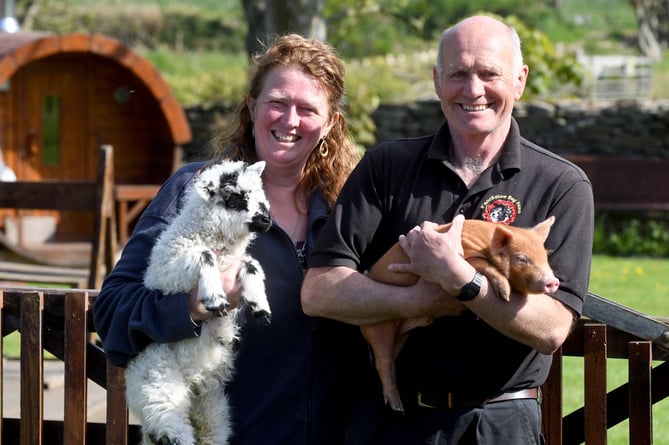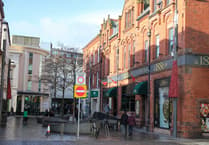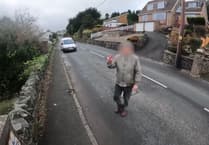The public’s enthusiasm for farming and the countryside remains high. The recent Lambing Live at Knockaloe Beg Farm saw no fewer than 3,500 visitors arriving at the farm over the eight days it was on.
On Easter Bank Holiday alone, 850 people turned up.
‘They do seem to like it. They like being hands on and touching animals I think. After the pandemic people want to get back to something with nature,’ says Fiona Anderson.
She and her husband John who farm Knockaloe Beg are a prime example of successful diversification, in their case into tourism, school visits and events like Lambing Live.
Though, as John points out, the latter does have its drawbacks. He says: ‘It’s one thing lambing sheep by yourself. It’s another thing lambing when there’s 60 people, maybe 80 people, watching you and it’s a difficult lambing, because you know it could go pear shaped.’
He has also made adjustments to his lambing schedule. He says: ‘We planned our lambing, putting the rams back a bit so we could do the last week of term with school visits and then one week [in the school holidays] with the general public coming.’
The couple clearly love having people around and, unlike most farms, they are already geared up for visitors, with five B&B rooms in their farmhouse, three self catering cottages and two camping ‘wigwams’.
It wasn’t always like this. John used to farm not only Knockaloe Beg, but also nearby Ballacallin and Ballamoar, both of which are owned by his brother, David Anderson, the former MHK and government minister.
‘The three were all farmed as one, with a dairy herd being the biggest part of it,’ says John.
Since 2015, Ballamooar and Ballacallin have been farmed by tenants who live at Ballamooar, while David lives at Ballacallin.
John says: ‘I’m just focussing on Knockaloe Beg. It’s easier on me because, to be honest, dairy farming is 24/7. You don’t get many dairy farmers, who go out of dairy farming, going back into it when they realise there’s life outside it.
‘I loved it but it absorbs a lot of time. If you ever go out to something in the evening you’ve got to go back to check there’s nothing calving, so it is much more of a tie. So, OK, we were busy here the last six weeks with lambing but it’s not like that all the year round.’
The income from tourism has made this quieter farming lifestyle possible. John says: ‘Realistically, if it was just the income from lamb on the farm, I’d have to have a job Monday to Friday, like a lot of Manx farmers do. But, because we get income from people coming, that changes all of that.’
Many people will remember the Andersons taking part in Channel 4’s Four in a Bed programme. For those who have never watched it, each episode sees four B&B owners competing against one another to prove their establishments offer value for money by visiting each other’s accommodation and deciding the amount they think is worth paying for it.
Interestingly, although the series originally aired in 2014, it keeps being repeated, so the Andersons are still getting bookings from it. It was shown again a few months ago and one woman stayed there just last week because she had seen the programme.
John says: ‘Initially we didn’t think we’d have any bookings from it, but some people, believe it or not, watch this programme every time and they chose where to go on holiday according to it.’
‘We’ve had some who say they are trying to go and stay at all of them,’ adds Fiona.
One thing guests can be sure of is a proper Manx breakfast, using only local or at least British produce.
Fiona says: ‘I’m a bit OCD about it actually now. I’ve stopped buying any non-British fruit.
‘We only get fruit that is grown on the farm, only ever our own bacon, sausages and eggs, and only ever Manx black pudding.
‘You can’t get Manx baked beans but we grow lots of our own tomatoes and we use Manx bread.
‘This year I have stopped doing orange juice because I don’t think everyone needs orange juice and it comes a long way. So I’m just going to do apple juice.’
And she adds with a laugh: ‘I haven’t shopped in Tesco for 17 years because they didn’t support Manx farmers. They are changing now but they’re still getting my punishment!’
Peel butcher Steve Tate makes the bacon and sausages from the Andersons’ own Tamworth pigs, which are also a visitor attraction.
John says: ‘We used to have two litters per year but now we try and have them in the springtime so this year, thankfully, one of them gave birth on the first Saturday of the Easter holidays and it was lovely because two people stayed all afternoon, from the start of the delivery to the end of the delivery, just because they were transfixed by it, they loved seeing something like that.
‘So, economically, it doesn’t pay us to keep pigs but it does because we can’t isolate the farm and the tourism business because people come because of the farm.’
Fiona adds: ‘It’s interesting because normally you’re not allowed to touch pigs because they metabolise viruses really quickly but I think, because ours are free range and very extensively reared, there’s not nearly such a problem.’
John adds: ‘Everybody wants to hold a pig and have a selfie with a pig.’
The use of as much local produce and cutting down food miles is something Fiona also takes the opportunity to promote when they have school visits to the farm. It is clearly needed: when a Douglas reception class visited recently, it turned out that many of the children had never been on a farm before.
This leads to the concern that many people are now so distanced from food production that farming is becoming romanticised and Fiona is having none this.
She says: ‘We talk a lot about food provenance and we’re pretty black and white with the kids. We show them a list of animals and explain why Farmer John keeps them.’
On one occasion, Leece’s wagon arrived when some schoolchildren were there, to take lambs to the abattoir. Fiona was horrified to hear the teacher say: ‘Oh they’re just going off for a visit.’
She soon put them straight: ‘Children need to know from when they’re little that this is normal.
‘We talk about long and happy lives and how farmers look after their animals really well and they live outside and then we eat them.’
The Andersons have four children and John says he can’t see any of them going into farming.
Their eldest daughter, Zoe, did a degree in anthropology and is now Scottish director for the International Justice Mission 28, the biggest antislavery charity in the world. In 2019, John walked from Land’s End to John O’Groats and raised £40,000 for them.
Their son, Tom, has just started an engineering job in Leeds working on dams and reservoirs. He’s getting married in September on the Isle of Man.
Daughter Kate shares a flat with Zoe in Edinburgh and works in intensive care as a nurse, whilst Amy is also in Scotland, doing media for a Christian outdoor pursuits centre.
John says: ‘Kate comes home for lambing and she’s great if we’ve got a difficult lambing because she’s got small hands. Tom loves trees and we’ve planted a lot of trees this last year.’
This brings us on to the new Agri Environment Scheme, something farmers tend to be divided in their views about.
On the plus side, John and Fiona now receive some financial support for their school visits. They are also passionate about the environment.
They have had some hedges laid, have put up wildlife boxes and would like to do more tree planting. But, like most farmers, they found the amount of paperwork involved with claiming through the scheme off-putting. ‘I don’t think I’d want to do it every year,’ John says.
And he adds: ‘A lot of farmers are feeling rather disgruntled that their support’s gone down at a time when there are going to be food shortages.
‘We should still be self sufficient and I would definitely go with that. That’s part of our passion, really, the more stuff we can grow on the island the better.
‘But, like the organic movement, [the AES] has made farmers question: should we be worming religiously, every time, should we always be spraying? It’s questioning the economics and also the long term effects it’s going to have.’




